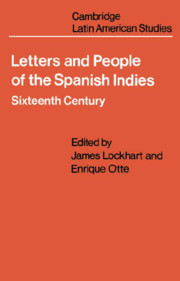Book contents
- Frontmatter
- Contents
- Preface
- Part I Conquest
- Part II The Variety of Life in the Indies
- 11 An encomendero's establishment
- 12 An encomendero's opinions
- 13 The miner
- 14 Commerce across the Atlantic
- 15 The professor of theology
- 16 The new arrival
- 17 The tanner and his wife
- 18 The troubadour
- 19 The nephew
- 20 The garden and the gate
- 21 The woman as settler
- 22 The farmer
- 23 The petty dealer
- 24 The Flemish tailors
- 25 The nobleman
- 26 The Hispanized Indian
- 27 Indian high society
- 28 An Indian town addresses the king
- Part III officials and Clerics
- Bibliography
- Index
14 - Commerce across the Atlantic
from Part II - The Variety of Life in the Indies
Published online by Cambridge University Press: 06 August 2018
- Frontmatter
- Contents
- Preface
- Part I Conquest
- Part II The Variety of Life in the Indies
- 11 An encomendero's establishment
- 12 An encomendero's opinions
- 13 The miner
- 14 Commerce across the Atlantic
- 15 The professor of theology
- 16 The new arrival
- 17 The tanner and his wife
- 18 The troubadour
- 19 The nephew
- 20 The garden and the gate
- 21 The woman as settler
- 22 The farmer
- 23 The petty dealer
- 24 The Flemish tailors
- 25 The nobleman
- 26 The Hispanized Indian
- 27 Indian high society
- 28 An Indian town addresses the king
- Part III officials and Clerics
- Bibliography
- Index
Summary
Francisco de Escobar, merchant of Seville, to his junior partner Diego de Ribera in Lima, 1553
… I have written you with this fleet all about everything going on.…
The third great constituent of the life-support system of Spanish American cities, along with the encomiendas and the mines, was commerce. Since the reader has already been exposed to two merchants’ letters of progressive difficulty (Letters 4 and 5), we now present him with the maximum challenge of a voluminous letter from the nerve center of one of the large trans-Atlantic companies, at a time when the trade had reached full maturity. The other two letters were written by junior partners in the Indies; this one is from a senior partner in Seville to the factor-partner in Lima. Francisco de Escobar, the merchant in Seville, is no novice to the Indies, however, for he had typically enough been active in Peru for years, accumulated capital during the ftrst boom of Potosi, and advanced to head his own company based in Seville. On a several-year term, the company arrangement included two partners in Seville, a representative on the Isthmus to forward goods toward Peru, a partner in Lima seeing to distribution there, and underlings in Lima and other places in Peru.
The letter is written in stages, over a two-month period, and is really several letters in one. Certain leitmotifs run through the whole, one of the more charming being the advancing pregnancy of Escobar's wife Marcela de Carvajal. Not advancing, rather constantly being harped upon, are the 780 pesos that Juan Lopez, the Panama man, double-charged Escobar for transportation of goods. Escobar is unable to forget it for more than a couple of pages, and mentions it in every conceivable connection. The death of Juan Lopez and the company reorganization made necessary thereby are the real occasion and substance of the letter. Escobar considers one type of company, then another, then yet another, with both organization and personnel changing constantly.
In the course of the discussion Escobar brings up some matters vital to an understanding of the evolution of trans-Atlantic commerce.
- Type
- Chapter
- Information
- Letters and People of the Spanish IndiesSixteenth Century, pp. 86 - 113Publisher: Cambridge University PressPrint publication year: 1976



